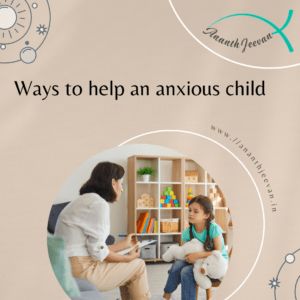Anxiety in Children

What is Anxiety?
Feeling tensed, having anxious thoughts, and physiological changes like elevated blood pressure are all characteristics of anxiety. Typically, intrusive thoughts or unreasonable fear impacts the lives those with anxiety disorders. They might stay away or try to avoid specific situations out of fear. Additionally, they might exhibit physical telltales including sweating, shaking, disorientation, or a rapid heartbeat.
What are the signs of anxiety in children?
When children have anxiety it not easy for them to express their problems clearly. The Parents/Adults must look for signs. Here are a few indicators that can help parents identify. Changes in the sleeping pattern, whether/why the child is not able to sleep properly. Getting irritable, angry or throwing tantrums with very little or no provocation. When the child cries frequently. Waking up at nights, bed-wetting. Frequent quarrels with siblings or friends. Not wanting to play with others. Change in behavior, not taking part in the activities which they used to do, or being withdrawn.
What are the different types of Anxiety faced by Children?
There are some common anxiety disorders in children such as Generalized Anxiety, Social Anxiety, Separation Anxiety, Selective Mutism, Specific Phobia and Panic attacks. There are also other anxieties in children which are not so common.
The symptoms of Generalized Anxiety is that children worry about a future events, past events, social acceptance, school performance, friendships and family acceptance. This may result in problems like fatigue, irritability, muscle tension, difficulty concentrating, or sleep disturbances.
Children with Social Anxiety do not like to interact with others. They have extreme fear to take part in social activities. They may end up throwing tantrums, freezing up, refusing to speak or breaking down.
Separation Anxiety is the fear of separation from their parents/loved ones. Fear of separation may be common for children under 2 years, for children over 2 years if it is considered a disorder. Some of the symptoms of this disorder are clinging to parents, refusal to go to school, extreme and severe crying, temper tantrums, refusing to sleep alone and failure to healthy interactions with other kids’ peers are encouraged.
When a child is unable to speak in certain situations it is Selective Mutism. A child may be very normally speaking at home but is certain situations like the class room is just not able to speak. Children with Selective Mutism are shy and withdrawn, disinterested or sulky, stiff, tense or have poor co-ordination, rude or nervous
A child has anxiety when exposed to a certain object or situation it is Specific Phobia. He or she stays away from the object or situation and not able to take part in normal activities. The common phobias are fear of heights, closed places, insects, animals or heights. The symptoms of Specific Phobia are increased heart rate, chest pain or discomfort, shortness of breath, upset stomach, sweating, trembling or shaking, feeling dizzy or faint and fear of dying.
Panic Disorder is when a child has recurring panic attacks and ongoing concern about having more attacks for longer than one month. A panic attack is an episode of intense fear and anxiety including both physical symptoms and fearful thoughts. The symptoms are feeling like one needs to escape, racing heart, choking sensations, dizziness, trembling, numbness in the limbs, fear of dying, fear of going crazy.
How can you help?
As a parent or a person taking care of the child the first thing you need to do is to learn ‘what is anxiety’. There are many useful sites where you can get material. Talk to your child about his/her fears or worries. Tell your youngster that you are aware of their feelings. Being supportive to your child is important. They should have the confidence that parents can help. Parents can help the children by acknowledging how they feel. You can aid them in taking charge of their ideas and actions. Consult your nearest doctor if your child has any of the physical symptoms. That is a good place to start.You can speak with a mental health specialist. Once you are able to see any signs or symptoms you should get in touch at the earliest, this would help to resolve the issue quickly.
If you or anyone you know needs help contact us: hello@ananthjeevan.in
